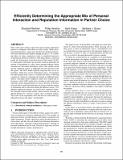| dc.contributor.author | Reches, Shulamit | |
| dc.contributor.author | Hendrix, Philip | |
| dc.contributor.author | Kraus, Sarit | |
| dc.contributor.author | Grosz, Barbara | |
| dc.date.accessioned | 2009-03-02T21:45:23Z | |
| dc.date.issued | 2008 | |
| dc.identifier.citation | Reches, Shulamit, Philip Hendrix, Sarit Kraus, and Barbara J. Grosz. 2008. Efficiently determining the appropriate mix of personal interaction and reputation information in partner choice. In Proceedings of the 7th International Joint Conference on Autonomous Agents and Multiagent Systems (AAMAS-2008), May 12-16, 2008, Estoril, Spain, ed. ACM International Conference on Autonomous Agents, Lin Padgham, and David Parkes, 583-590. Richland, South Carolina: International Foundation for Autonomous Agents and Multiagent Systems. | en |
| dc.identifier.uri | http://nrs.harvard.edu/urn-3:HUL.InstRepos:2641074 | |
| dc.description.abstract | Many multi-agent settings require that agents identify appropriate partners or teammates with whom to work on tasks. When selecting potential partners, agents may benefit from obtaining information about alternative possibilities through gossip (i.e., by consulting others) or using a reputation system (a centralized repository of information about past behavior). This paper defines a statistical model, the "Information-Acquisition Source Utility model" (IASU) by which agents operating in an uncertain world can determine the amount of information to collect about potential partners before choosing one and which information sources they should consult (gossip, reputation system, or additional personal interaction with the agent). The IASU model explicitly represents the cost of information, which may vary by information source. To maximize the expected gain from a choice, it estimates the utility of choosing a partner by iteratively estimating the benefit of additional information. The paper reports empirical studies that compare the effectiveness of the IASU model with a baseline in which only prior experience with a potential partner is used as the basis of the decision and with a model that determines in advance both the amount of information and its allocation among the different sources. Two different application domains are used in these empirical studies, the Surrogate Venture Game model, which concerns choosing an optimal partner for a business venture, and a restaurant domain. The results of the experiments show that the use of the model significantly increases the agents' overall utility. | en |
| dc.description.sponsorship | Engineering and Applied Sciences | en |
| dc.language.iso | en_US | en |
| dc.publisher | Association for Computing Machinery | en |
| dc.relation.isversionof | http://portal.acm.org/citation.cfm?id=1402306 | en |
| dash.license | LAA | |
| dc.title | Efficiently Determining the Appropriate Mix of Personal Interaction and Reputation Information in Partner Choice | en |
| dc.relation.journal | Proceedings of Autonomous Agents and Multi-Agent Systems | en |
| dash.depositing.author | Grosz, Barbara | |
| dc.identifier.doi | 10.1145/1402298.1402306 | |
| dash.contributor.affiliated | Grosz, Barbara | |


